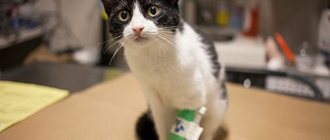How to survive the death of a beloved cat or kitten, and relieve the pain of loss as an adult: advice from a psychologist
Sometimes, coping with the death of a beloved cat is just as difficult as coping with the death of a loved one.
Lonely people experience the death of their pets especially hard. If they get cats and dogs after the death of a husband, wife or child, caring for a small and helpless creature takes away the pain of losing a loved one. And pets become full members of the family.
Such a small family consists of a cat and a mistress or owner. And then the hostess divides a piece of sausage between two, milk is poured out for two, and animal food is bought personally for the pet. You can also knit socks and blouses for him so that he doesn’t freeze when it’s cool in the apartment.
Animals are capable of feeling such care and more than give their owner their love and affection instead. The pedigree of the cat or dog in this case does not matter. And outbred Ryzhiki, picked up on the street, will compete with any purebred cat in terms of their quality of life.
Cat as a full member of the family
If for some reason an animal dies, how can you cope with the death of your beloved cat if the whole world goes away with its passing? This is not an exaggeration of the condition of a person whose cat died, but a real picture of the depression that a person falls into.
- Advice to get a new kitten does not work in this case, because the person is experiencing very severe mental pain, and the new animal will remind you that quite recently there was another cat in this house.
- Advice to take sedative medications, or to spend more time in the fresh air, also does not work because the person rejects any attempts by friends to bring him out of his state of grief.
- Sometimes people, in their impulse to perpetuate the memory of an animal, bury it in an animal cemetery and erect marble monuments. And there would be nothing unnatural in this if the person were not completely immersed in a state of severe depression.
In this case, there is only one way to survive the death of a beloved cat, and it is that a person accepts the loss, accepts his grief and learns to live without his pet.
Each new day we live will gradually move us away from the black date. Each new day will bring a little relief and bring the time closer when you can get a new animal or find solace in other activities. Sometimes in such cases the advice that helps is to adopt a cat from an animal shelter. Orphan cats in such shelters are similar to orphans in orphanages.
How to cope with the death of your beloved cat
Help from professionals
When considering how to come to terms with the death of a cat, this option should not be dismissed. Very often, the death of a pet is such a strong stress for a person that he cannot cope with it on his own, and internalized stress is the main cause of depression. That is why you should not be embarrassed to ask for professional help, especially since such a reason for seeking help would not surprise a modern psychologist.
Experts will help you understand that a person is not responsible for the care of a pet, that he should let it go and move on with his life, especially since there are many positive moments in life. If the cat had to die painfully, then the owner experiences extreme stress. However, it is worth understanding that now the animal is no longer suffering, it has gone into another dimension.
Note! Parents need to pay attention to the psychological state of the child. If he has become withdrawn, uncommunicative, and strives to avoid communication with adults, then perhaps he suffers from remorse. In this case, professional help will help solve the problem.
If a person cannot cope on his own, there is nothing wrong with seeking professional help.
How to help a child or teenager survive death or the loss of a beloved cat or kitten: advice from a psychologist
If a child is having a hard time with the death of a beloved cat, the parents bear a double burden. They themselves need to cope with the pain of their pet’s passing into another world and help a child or teenager in such a difficult situation.
It is impossible to compare the experiences of adults and children, because children do not yet have experience of such situations and may have a vulnerable soul.
How to help your child cope with the death of a beloved cat:
- If parents have a trusting relationship with their child or teenager, then the joint work of parents and child, not so much with the body, but with the soul, can help in this situation. Strive to be your child's friend in any situation.
- If the baby is crying and upset , you need to try to distract him from sad thoughts, for example, by going to his favorite places for walking outside. It will be better if you do not meet cats in these places.
- Some parents immediately run for a new kitten. This is not entirely the right decision. Just like adults, a child must go through the pain of loss . He must overcome this loss and become a little stronger and older.
But, if the period of grief has dragged on and the child himself wants to get a new pet, perhaps it is worth meeting him halfway. After all, childhood depression is more difficult to treat than adult depression.
A new cat is a cure for depression
Practical advice
The death of a cat is equally difficult for both women and men. A severe emotional state during this period can lead to depression and other psychological illnesses. This can happen if you focus only on your grief and fall out of active life.
© shutterstock
To prevent this from happening to you, use the tips below::
- Talk to the people who care about you. Don't bottle up your emotions or suppress them. Talking to people close to you and getting support will help you feel better. Suppressing emotions sometimes leads to various diseases, both physiological and mental.
- Avoid communicating with people who may hurt your feelings. Unfortunately, not all people are kind and want to listen to other people’s problems about the death of a cat. If you start telling them about your grief, you may encounter a rude response, which will worsen your condition. This doesn’t mean that people are bad, it’s just that not everyone likes to hear about other people’s grief. Especially when they have their own problems.
- Try not to react to statements such as: “stop whining”, “what are you like little”, “died and died” and the like. Focusing on such caustic phrases will not do any good. Remember that you have the right to express your emotions the way you want. People have no right to tell you that you shouldn't experience grief.
- Don't fall out of life. Remember that you have a family and possibly other animals. Spend time with them and take care of them. Life does not end with the death of a cat, there are also other people and animals around who need you.
- Do something to distract yourself. If you don't have a hobby, find one. Go in for sports, as during exercise a person produces a hormone of happiness. Take time for yourself, relax, read a book or get out into nature. These hobbies will help you feel better.
By following these tips, you will not get rid of grief completely; you will still have to go through a difficult period after the death of your cat. But you can distract yourself and make it less painful.
The death of a cat is my fault - I feel guilty before the dead cat: what to do, how to live?
Very often, people realize how important a cat was to them only after losing it. And this feature is inherent not only after the loss of an animal, but also after the departure of a loved one.
Love is also ephemeral, it cannot be held in chains, and only when it leaves along with those who loved us do we begin to suffocate from the lack of love. And sometimes it doesn’t matter whether a cat or a person loved us. After the death of the creatures we love, it can be very painful. If a feeling of guilt is added to grief, then it becomes simply an unbearable burden.
I feel guilty about the deceased cat, what to do, how to live - such thoughts are typical for people with a heightened sense of responsibility for pets.
Such self-flagellation will not bring the pet back, but will block the way for the person to be able to have a pet again. Perhaps you are exaggerating your guilt somewhat? And you need to think about the fact that new happiness will come to your home with a new cat? Just wait a little, time will pass, the pain will dull, and you will again be able to give affection to your new pet.
How to let go of a dead cat, how to deal with depression after the death of a cat, how to calm down?
If you don’t know how to let go of a dead cat, and thoughts about it haunt you, it’s best to consult your friends on this topic . Your friends probably have similar experience, and often it gives much more valuable advice than the experience of psychologists who can judge such a problem only from a medical point of view.
Crying to a friend and telling him about your problem can be very useful because by voicing your sad thoughts, you direct yourself to a constructive solution to the problem. If you don’t have such a friend, you can chat with people who have encountered a similar problem on a forum for cat lovers.
The main thing is not to get hung up on this, and the question of how to deal with depression after the death of a cat, how to calm down, will no longer worry you.
The best remedy for depression
Emotional experiences of a person when losing a pet
In addition to all the familiar reactions, such as tears and sadness, there are other manifestations of grief, which, if not known, can be mistaken for lack of concentration, eccentricity, and other qualities. Among the main manifestations of grief are the following:
- Physiological. Physiological symptoms of acute negative experiences include a painful feeling of tightness in the chest area, a feeling of emptiness in the abdomen, spasms in the throat and the feeling of a lump stuck in it;
- Behavioral. A person experiencing grief often seems inconsistent and inattentive. His gaze can be described as absent, absent-minded. The inability to concentrate on business often irritates household members or colleagues, which leads to painful conflicts. Other manifestations include insomnia, which further increases absent-mindedness;
- Cognitive. A grieving person may encounter unusual holes in his memory, confused thoughts that do not want to take on concrete shape. Difficulty focusing and concentrating is common. The person seems to be “not here”;
- Emotional. The feeling of loneliness that accompanies people who have experienced loss is accompanied by a heightened awareness of their own helplessness, causeless anxiety and all-encompassing guilt, to which the person indulges.
When will the pain of the loss, the tragic death of a cat, go away?
The pain of the loss, the tragic death of a cat, will not go away in one day. In one day this pain will decrease. Unfortunately, there are no instruments that measure mental pain and there is no miracle pill that, when taken, can help you find yourself in another reality.
Based on the experience of people who have lost their beloved pets, we can say that a month after the tragedy, the pain will significantly ease, and six months later, new excitement, impressions and new pets will completely change your life. If you cannot forget the death of your pets for a long time, you may need qualified help from a psychologist.
Cats Die Alone
Feeling the approach of death, cats tend to get away from people.
When this is not possible, they hide in a secluded place. There are symptoms by which you can determine the imminent death of a cat:
- loss of appetite, refusal of food and water;
- shortness of breath and difficulty breathing;
- slow heartbeat and low blood pressure;
- a decrease in temperature and the presence of an unpleasant odor.
These are warning signs, especially if your cat is over 10 years old. If you discover their presence, contact your veterinarian - perhaps the animal is simply experiencing an exacerbation of a chronic disease. In hopeless cases, the doctor may suggest euthanizing the animal. If this option is unacceptable, surround the cat with care and create conditions for a calm death.
Why does a cat die, what does it take with it: signs
A cat can die from old age and illness, die tragically under the wheels of a car, and only in very rare cases does an animal die due to the carelessness of its owners.
Sometimes you can read that a cat dies not by accident and its death takes the owner’s problems with it.
Signs about cats
Indeed, the spiritual connection between a cat and its owner can be so strong that the death of one of this pair causes the spiritual collapse of the one who outlived his friend. Moreover, cats can also suffer if their owner dies.
If death separated those who loved each other, then the time has come for grief and loneliness . Don’t think that this black streak in your life is forever. Get over this grief, suffer through it, there is no other way, and believe that love awaits you ahead. After all, even a small cat can give you great love.
How to survive the death of a pet cat: reviews
Reviews on how to survive the death of a pet:
- Evgeniy, 20 years old: When our cat got sick, my parents, mother and stepfather, treated her. And more than 10 thousand rubles were spent on treatment. The cat died anyway. A few months later I fell ill and was admitted to the hospital. My parents didn’t give me anything for treatment. Why such injustice? Some people value cats more than their own children.
- Elena, 50 years old: My cat died at the hands of a neighbor. Moreover, he poisoned not only her, but also her kittens. Of course, I wanted to apply lynching to this neighbor. Because punishment for people who abuse animals does not work. In fact, such people go unpunished. I was depressed for a long time.
- Natalya, 40 years old. My beloved cat disappeared a week ago. She jumped out into the entrance when I entered the apartment. I couldn't catch up with her. It’s a pity for her, because she has never left the apartment and doesn’t know how to live on the street at all. And I go every day looking for her. The worst thing is not knowing whether she is alive or not.









